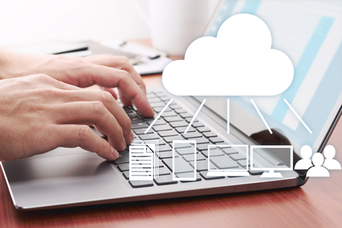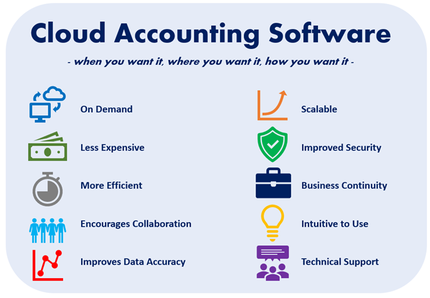In Pursuit of Profit
Read our expert article below or sign up to get articles sent to your inbox.
 Cloud accounting is accounting software that allows you to keep the books online for your business. Financial data is encrypted and then hosted on a remote server instead of in-house for greater accessibility. With cloud accounting software (sometimes referred to as “online accounting software” or “web-based accounting software”) data is saved to the cloud and accessed by users on demand. In a nutshell, Users subscribe to an online accounting software solution and move their books to the cloud. From then on, they can access their accounts from any web browser, or from an app on their phone. Most users connect the software to their business bank account, so that banking transactions flow automatically from the bank to the books. This saves them from a lot of data entry. Some accounting software companies, like QuickBooks, have both desktop and online versions, while other companies offer only cloud-based options. The QuickBooks cloud-based software, QuickBooks Online, remains one of the most widely used accounting platforms year after year. However, companies like Xero, Zoho, Wave, FreshBooks, GoDaddy, 17hats have been growing in popularity recently. While widespread accessibility is the primary reason companies choose to use cloud accounting software, there are many benefits to consider when determining whether cloud accounting is right for you.  The Benefits of Cloud Accounting The biggest benefit of cloud accounting offers is allowing employees to access financial data on demand – when they want it, where they want it, and how they want it. This real-time accessibility leads to better strategic decision-making companywide. Additionally, cloud accounting platforms are typically less expensive because license fees do not need to be paid to set up each new user and new version releases are included in the ongoing cost. These included enhancements also reduce the need for ongoing version and update management, eliminating busywork. Cloud accounting streamlines work for greater efficiency in day-to-day workflows, ongoing reporting, and with other financial deliverables. It also allows for better data sharing and collaboration to facilitate teamwork, especially across locations. Furthermore, software integrations automate data entry to improve financial data accuracy and speed up processing time for things like expense receipt submissions. As a result, it lets businesses to scale operations quickly and have their books keep pace. In most cases, cloud accounting platforms provide improved security over onsite data hosting, reducing the risk of fraud and data loss. Permission levels restrict user access to maintain financial controls while automated backups and offsite data storage ensure business continuity in the event of a disaster. As Thompson Reuters Tax explains in their white paper, The cloud also potentially provides additional security that offline, localized programs doesn’t [sic] offer… Cloud-based accounting applications and online portals have multiple levels of security. This includes several layers of security that your firm may not be able to replicate, including physical security, software security, and personnel security. You may think that you can put the proper safeguards in place, but wouldn’t it be smarter to let companies that do this for a living assume all that risk instead? It is typically more intuitive to use as well, allowing new employees to be onboarded faster by reducing the learning curve. When technical issues do pop up, help is available with cloud accounting software. Included technical support is provided to troubleshoot problems when they arise, instead of putting the onus on in-house staff.
Should You Use Cloud Accounting Software? When we talk to business owners the sticky point we usually hear is a concern over privacy and data security. Any of your privacy or security concerns about using the cloud can be allayed by reminding yourself that you are using the cloud any time you pay bills online, stream a show or movie, backup your computer files to a third-party server, or share photos with loved ones online. When asking yourself, “Should I use cloud accounting?” remember that cloud accounting software is idea for companies that:
Find out more about two of the most popular cloud accounting software options for businesses: QuickBooks Online and Xero. |
SUBSCRIBE:DOWNLOAD:DOWNLOAD:Categories:
All
Archives:
July 2024
|
Services |
Company |
|
1/18/2021